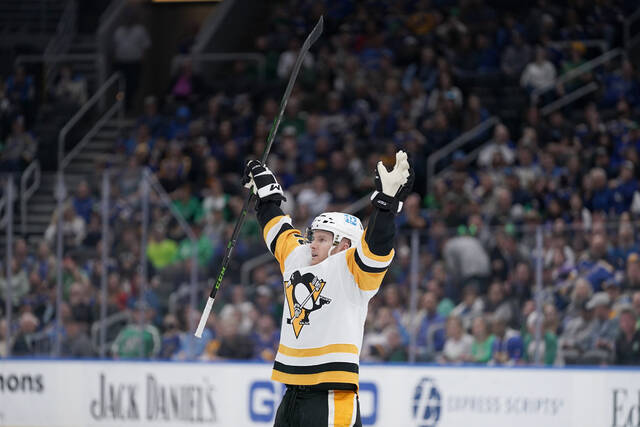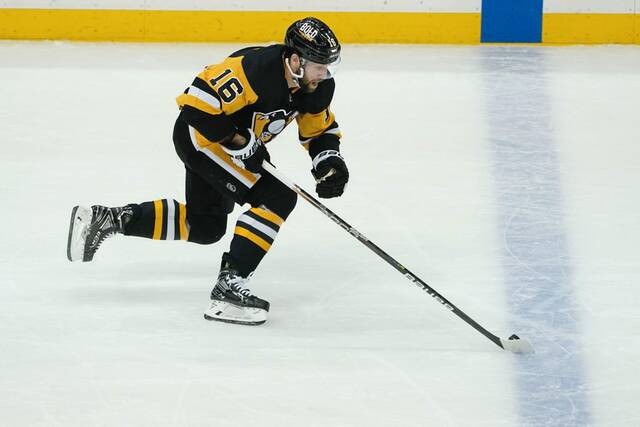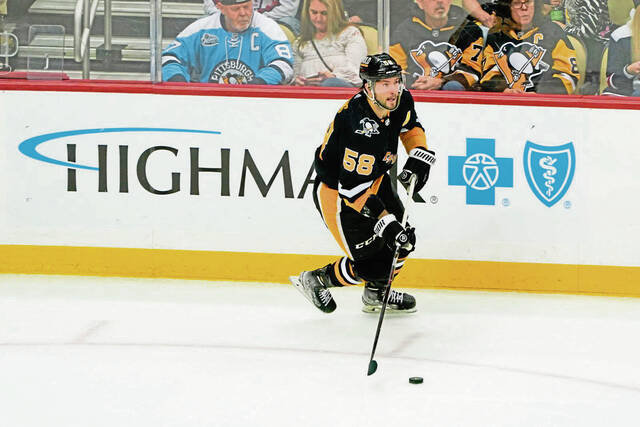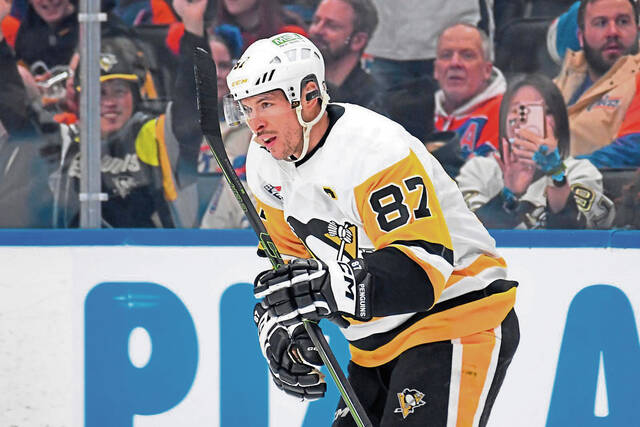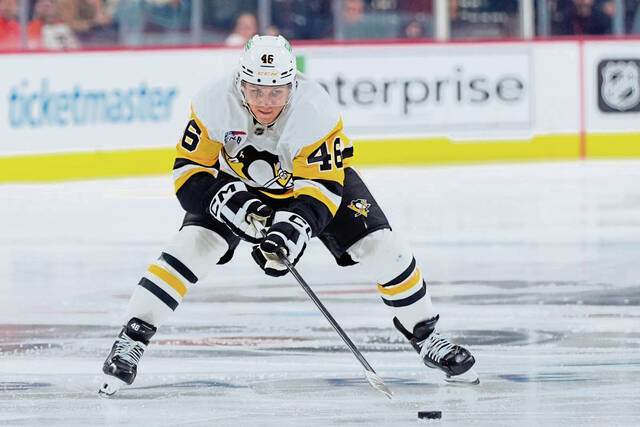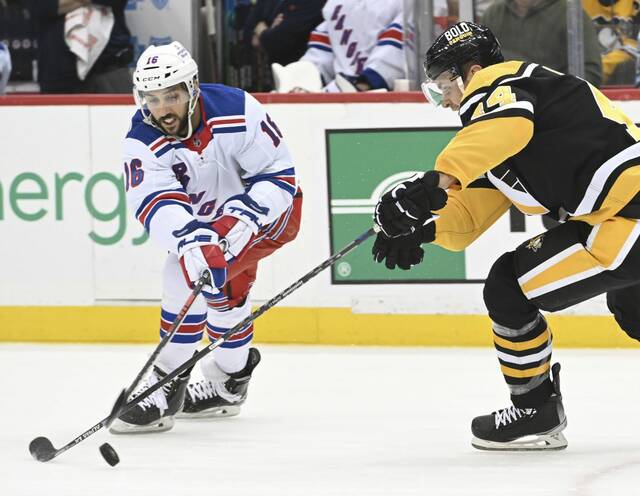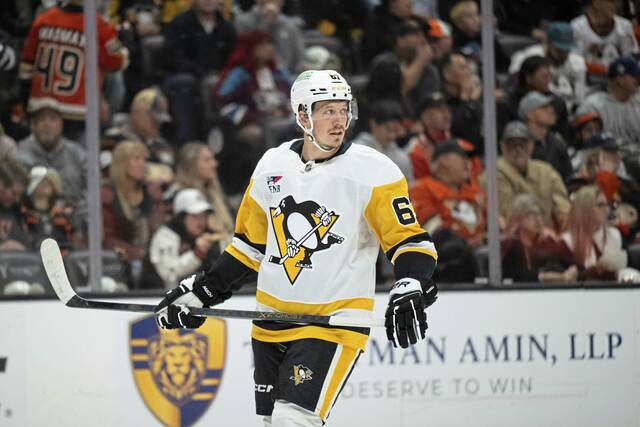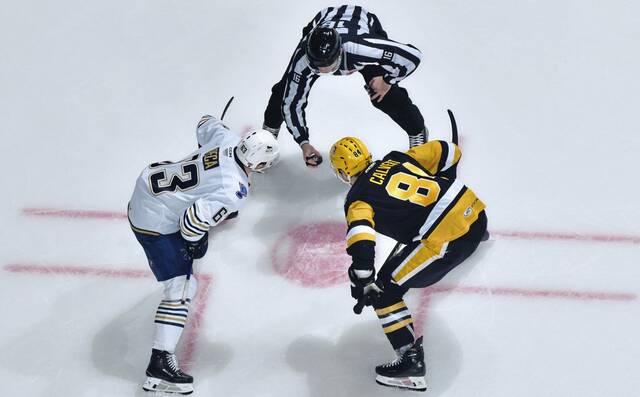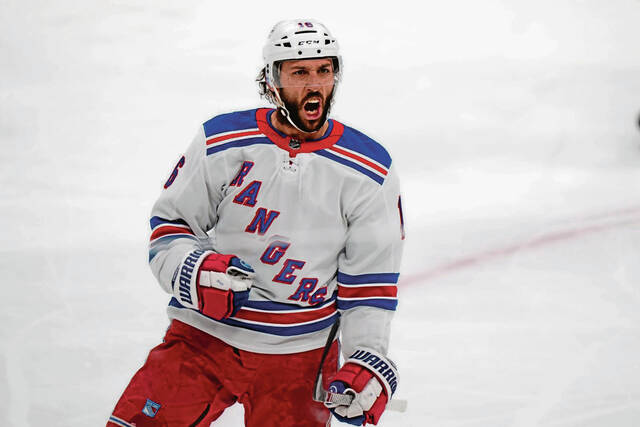Sidney Crosby is a history geek.
He is fascinated by the subject, especially when it comes to the military.
Recently, he watched “Hyena Road,” a dramatic film based on a true story of Canadian soldiers during the Afghanistan War.
History is something Crosby values, and it’s something he respects.
It’s also something he rejects.
At least with one narrative.
The one that says older hockey teams can’t win the Stanley Cup.
Coincidentally, he happens to be the captain of the NHL’s oldest hockey team entering the 2022-23 season.
“I don’t get caught up in it,” Crosby said. “If I’m starting the year thinking we’re too old, if anyone has that mindset, it’s not very good. I don’t think guys have played this long or done this well or got to this point without being motivated and liking challenges. That’s our mindset. That can be something that motivates us.”
At 35, Sidney Crosby already has won the Stanley Cup three times in his first 17 seasons in the NHL. And there’s little evidence he or his fellow tricenarians on the Pittsburgh Penguins roster are anything less than motivated to win another title (or more) before they hit 40.
Age isn’t a concern for them. But it is a consideration.
That’s why a number of the Penguins’ 30-somethings go about the business of being a professional athlete differently than they did in their 20s (or late teens in a few cases such as Crosby or fellow franchise center Evgeni Malkin).
Throughout training camp, Crosby and the other “old guys” on the team discussed how they’ve adjusted their regimens — from working out to diet to sleep — in order to remain — in their eyes, at least — Stanley Cup contenders.
Work smart, not hard
Even before Crosby broke into the NHL as an 18-year-old in 2005, his obsessive nature to working out was as much his brand as his dagger of a backhander or his frenetic skating style.
Crosby being the game’s “Next One” wasn’t necessarily the result of good genetics or just simple luck. His success wasn’t an accident.
But at 35, he acknowledges the need to make subtle adjustments to his trademark workouts.
“Just trying to manage energy,” Crosby said. “For the most part, I feel like I’ve always felt like I recovered pretty good. I don’t change that up. Maybe you shorten up practice. Instead of staying out there for a half hour, you stay out there for 15 minutes instead. I don’t change too, too much. But you’ve got to listen to your body, too.”
Unlike Crosby, 32-year-old defenseman Chad Ruhwedel wasn’t the top pick in an NHL Draft. In fact, he wasn’t drafted at all.
So like Crosby, he has had to adhere to a fastidious workout routine to carve out a 10-year career.
Now on the other side of 30, Ruhwedel works out in a more efficient manner.
“It’s not necessary how much, how heavy you are lifting,” Ruhwedel said. “It’s doing it the right way, smart.”
Kris Letang, 35, seemingly always has boasted an intense training regimen dating to his 20s. And he has done little to waver from that.
But after a herniated disc that ended his 2016-17 season prematurely, he has invested more into helping his body recover from the typical rigors of a physical sport. That has led him to see an osteopath on a more regular basis since the injury.
“I think I learned a lot more about soft tissue work,” Letang said. “More of the rehab side. But the training is the same. It’s just that I’m more aware of getting the proper treatment. And it’s staying on top of it throughout the summer, too. Before, I was only doing it during the season because that is when we demand it on our bodies. But I started using it more and more throughout the summer.”
Over the past three seasons, Letang has missed only 13 of a possible 207 regular-season games.
“I dealt with injuries,” Letang said. “I did some stuff differently on my body on the rehab side of it. I’ve been knock on wood, healthier than ever and I’m as fit as I’ve ever used to be. I keep getting the same training in, but I’m a lot more careful than I was with my body. It allows me to be a lot more healthy. I don’t feel my legs slowing down anytime soon.”
The biggest obstacle to training or caring for your body in your 30s might be … well … being in your 30s. That’s to say life — family, kids and other interests — can get in the way of a proper workout or stretching session.
“As you get older, there’s other things in your life that can kind of pull you away from that a little bit,” said defenseman Brian Dumoulin, 31. “Obviously, having a kid, that challenges you in that aspect where you still need to make enough time for him and your family. It also puts things into perspective. Instead of laying around the couch all day, I’m more efficient in getting things done. Just staying on top of your body and utilizing every second of the day to help benefit you is something that I’ve tried to focus on.”
Guilty pleasures get guiltier
Forward Jason Zucker turned 30 in January. So he’s not about to hit up any kind of early-bird specials or scout retirement communities in Florida.
But he does acknowledge he’s not in his 20s anymore.
“When you’re younger, you seem to not get tired, not get fatigued,” Zucker said. “Day after day, you feel you can just keep going and not have it be an issue. Now, I feel like if I have a couple beers, I feel it a few days later. So I’ve definitely changed that quite a bit.”
Guilty pleasures will remain with anyone at any age. But when you’re a professional athlete, they feel really guilty.
For defenseman Jan Rutta, 32, it’s comfort food from his home country of Czechia during the summer months.
“I indulge myself in Czech cuisine a little bit, which is a little heavier. But during the season, it’s pretty much the same. … My favorite is probably goulash. We have a lot of meals with dumplings and sauces. That’s heavy.”
Crosby is hardly immune to having a sweet tooth.
“I used to crush dessert. I used to crush a lot of stuff, a lot more than I do now,” Crosby said. “I like dessert, cake, donuts. I love dessert. I eat pretty much any type of dessert. Now, I don’t eat as much Reese’s (Peanut Butter Cups). We have the Justin’s (organic peanut butter cups). They’re pretty good, too.”
Having a kid can create some obstacles to eating clean.
“I do have a little bit of a sweet tooth at times,” Ruhwedel said. “It’s more like a candy once in a while. It’s something that I fight all the time, all the time. I try to make sure it’s not in the house and doesn’t get eaten. But it’s hard, especially with a young one.”
Early to bed and early to rise
Go ahead and insert a joke about old people needing to sleep here, but the Penguins — at least the more mature ones — value getting proper rest. And not just because everyone likes a nap.
Sleep is a key part of the recovery process.
“I love my sleep,” said defenseman Jeff Petry, 34. “Obviously, with travel and scheduling and kids, it’s definitely changed. But I’m not a guy that, on the road, stays up and binge watches shows. I rarely turn on my TV in my room. I use that as a chance to catch up on sleep. Even at home, the kids get down at a decent hour. I’m the same way during the season. I have my routine to get to bed early. Even if the kids are up early, I’m still getting that amount of sleep that I need.”
For Zucker, sleep has superseded his training and diet in one sense.
“I used to care more about my routine than I did about the sleep and the nutrition,” Zucker said. “If we had (games on back-to-back nights) and I didn’t get to sleep until 2 in the morning, I would still (wake up) at 8 a.m. I wouldn’t care because that’s what my routine was. Whereas now, I’m OK eating a couple of hours later because I need that two hours of sleep. I’ll sleep later and adjust my routine based on that extra sleep. … For me now, sleep is more important than that meal at 8 a.m. and the routine of that day.”
Generally, getting decent sleep is a major challenge for many hockey players considering games are often played at night and winding down one’s body after an intense aerobic activity is difficult. Other factors such as travel, particularly for teams in the Western Conference where travel is often more prolific, amplify the issue.
“That’s one of the hardest things in the season is consistency with sleep,” Dumoulin said. “You could get eight hours but just because you’re getting eight hours, it doesn’t mean they’re a quality eight hours. That’s one of the toughest things of playing games at night is getting to bed and then waking up. It throws off your sleep rhythm a lot. That’s one thing that people don’t realize. When you’re coming back east or going out west … there’s so much variance in your sleep. It’s really, really hard. That’s one thing that I’ve always tried to be dialed on. It’s easy for me to get on a good sleep schedule and feel really good every day. But it’s really hard during the (season). I’m really a good sleeper, but it’s definitely one of the challenges of the season.”
Older but not old
When general manager Ron Hextall held court with reporters July 13, the opening of the NHL’s free-agent signing period, he was asked directly what provided him with faith that re-signing a largely older group of players such as Letang and Malkin — who have not won a playoff series in four years — would lead to the ultimate success, a Stanley Cup title.
He punctuated his response with a succinct axiom.
“These aren’t ‘really good hockey players,’ ” Hextall said. “These are generational players. They make people better. We still feel like we’re still in the mix of the top teams in the league.”
The Penguins are at the top of the league in one sense. Their season-opening roster has an average age of 30.3, tops in the NHL. That represents a pretty big jump over the league average of 27.4.
In the past 20 years, only one team with an average age over 30 has won the Stanley Cup. That was the 2007-08 Red Wings who, at the ripe vintage of 32.1, beat a team full of 20-somethings in the Penguins, including a 20-year-old Crosby.
Even with the futility of the past four years, the Penguins profess they are still capable of that type of success.
“I believe these guys can still play,” coach Mike Sullivan said. “They’ve shown no signs, I think, of decline. I have the opportunity to watch these guys every day. I know the sacrifices they make. It’s not by accident that these guys are as good as they are and as accomplished as they are.”
“We’re getting a bit older. But we’re not old.”
For the Penguins players, age doesn’t appear to be anything but a number.
“I didn’t really worry about age when I was 18,” Crosby said. “I’m not going to start at 35.”



